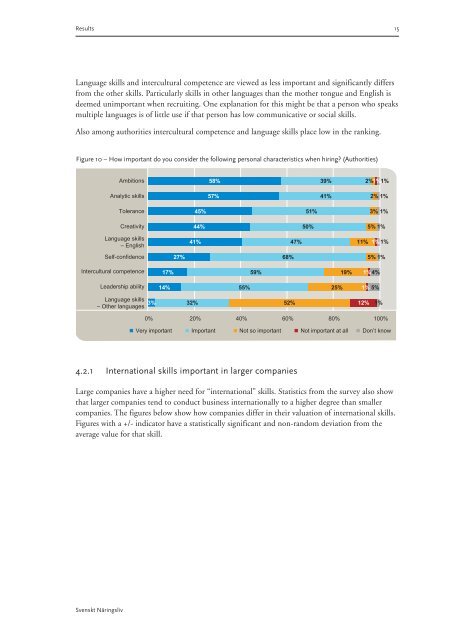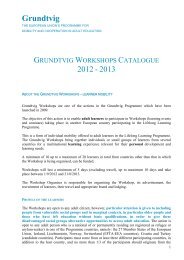Employers' view on studies abroad - Svenskt Näringsliv
Employers' view on studies abroad - Svenskt Näringsliv
Employers' view on studies abroad - Svenskt Näringsliv
Create successful ePaper yourself
Turn your PDF publications into a flip-book with our unique Google optimized e-Paper software.
Results 15<br />
Language skills and intercultural competence are <str<strong>on</strong>g>view</str<strong>on</strong>g>ed as less important and significantly differs<br />
from the other skills. Particularly skills in other languages than the mother t<strong>on</strong>gue and English is<br />
deemed unimportant when recruiting. One explanati<strong>on</strong> for this might be that a pers<strong>on</strong> who speaks<br />
multiple languages is of little use if that pers<strong>on</strong> has low communicative or social skills.<br />
Also am<strong>on</strong>g authorities intercultural competence and language skills place low in the ranking.<br />
Figure 10 – How important do you c<strong>on</strong>sider the following pers<strong>on</strong>al characteristics when hiring? (Authorities)<br />
Ambiti<strong>on</strong>s<br />
58%<br />
39%<br />
2% 1% 1%<br />
Analytic skills<br />
57%<br />
41%<br />
2% 1%<br />
Tolerance<br />
45%<br />
51%<br />
3% 1%<br />
Creativity<br />
44%<br />
50%<br />
5% 1%<br />
Language skills<br />
– English<br />
41%<br />
47%<br />
11%<br />
1% 1%<br />
Self-c<strong>on</strong>fidence<br />
27%<br />
68%<br />
5% 1%<br />
Intercultural competence<br />
17%<br />
59%<br />
19%<br />
1% 4%<br />
Leadership ability<br />
14%<br />
55%<br />
25%<br />
1% 5%<br />
Language skills<br />
– Other languages<br />
3%<br />
32%<br />
52%<br />
12%<br />
1%<br />
0% 20% 40% 60% 80% 100%<br />
Very important Important Not so important Not important at all D<strong>on</strong>’t know<br />
4.2.1 Internati<strong>on</strong>al skills important in larger companies<br />
Large companies have a higher need for “internati<strong>on</strong>al” skills. Statistics from the survey also show<br />
that larger companies tend to c<strong>on</strong>duct business internati<strong>on</strong>ally to a higher degree than smaller<br />
companies. The figures below show how companies differ in their valuati<strong>on</strong> of internati<strong>on</strong>al skills.<br />
Figures with a +/- indicator have a statistically significant and n<strong>on</strong>-random deviati<strong>on</strong> from the<br />
average value for that skill.<br />
<strong>Svenskt</strong> Näringsliv
















